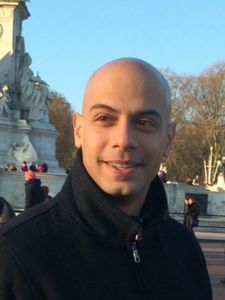"I Could Only Find the Answer as I Wrote" Mina Athanassious on His Collection of Coptic Egyptian Coming of Age Stories
Mina Athanassious's A Face Like the Moon (Mosaic Press) gathers eight deeply personal stories of Coptic children growing up in Egypt, including a story set in the largely-Coptic neighbourhood where the country's notorious, so-called "Garbage City" is located. There, children and adults alike eke out a living collection and sorting trash. Athanassious manages to find beauty in the bleak backdrop, telling a moving tale. The other stories take readers to small villages, classrooms, and other locations around the country, offering a fresh perspective on coming of age tales, packed with memorable characters and rarely explored locations.
We're excited to welcome Mina to Open Book to tell us about A Face Like the Moon as part of our Lucky Seven series. He tells us about the challenges Coptic Egyptians face (including an anecdote about his mother than inspired one of the stories in the collection), the question that is central to his stories, and the books that have inspired him, including an iconic short fiction collection.
Open Book:
Tell us about your new book and how it came to be.
Mina Athanassious:
I wrote most of A Face Like the Moon while doing my MFA. My mother told me a story about a high school history teacher she had in Egypt who showed her no love because my mother was Coptic. She gave her poor marks she didn’t deserve, never answered her questions, and looked her straight in the eye every time she mentioned a crusader atrocity. All this changed when my mother showed her the simplest, most unintentional kindness that broke down the teacher’s prejudice (described in the story First Crusade in my book). Her story inspired me to tell the stories of my people. It was my mentor, (the great) Rachel Kadish who initially told me I needed to find a publisher. I took her advice four years later.
OB:
Is there a question that is central to your book, thematically? And if so, did you know the question when you started writing or did it emerge from the writing process?
MA:
How does a seed grow in a field of mud and thorns?
All my stories are about the lives of Coptic children growing up in bad situations in modern day Egypt. Coming from the community, I had years of conversations and informal interviews to work with to understand their stories and character, both as a collective and as individuals. Through the process of writing my book, I found an inherent resiliency and constant push towards life and survival within my community that was both harrowing and hopeful. The answer to the question above was different for every child within the book. I could only find it as I wrote.
OB:
Did this project change significantly from when you first started working on it to the final version? How long did the project take from start to finish?
MA:
Not including the downtime between stories, writing A Face Like the Moon took between 3 to 4 years. Some of these stories changed substantially over the years, while others retained the heart of their character and situation with a few minor revisions of wording.
OB:
What do you need in order to write – in terms of space, food, rituals, writing instruments?
Your CanLit News
Subscribe to Open Book’s newsletter to get local book events, literary content, writing tips, and more in your inbox
MA:
Though not necessary, mood helps tremendously with my writing. I listen to music that helps me feel what I need to feel in order to write. I also take walks alone in the night to think through my characters and how they would react to certain situations. Other than that, I need a laptop, silence, and a strong voice against my consistent, nagging doubt.
OB:
What do you do if you're feeling discouraged during the writing process? Do you have a method of coping with the difficult points in your projects?
MA:
The difficult points in my projects are often my weakest points of writing. If I am not comfortable with what I have written, I will re-examine the character, the situation and the words themselves. I will review and rewrite continually until I am comfortable with my piece.
OB:
What defines a great book, in your opinion? Tell us about one or two books you consider to be truly great books.
MA:
A great book is one that opens my eyes to a character I may not quite understand in real life by showing me who they are in the context of a particular situation without the author’s rhetoric muscling through the meaning. I don’t care for writers sounding writerly. The Things They Carried by Tim O’Brien is my all-time favourite book of short stories. The cold, simple words O’Brien used to show life in the trenches during the Vietnam war felt accurate to the mindset of the main character. Another book in my all-time favourites list is The Brothers Karamazov by Fyodor Dostoevsky. Though the rhetoric was a little impassioned for me, Dostoevsky’s exploration of religion and moral philosophy and his application to character is rare in today’s writing, and he did it right.
OB:
What are you working on now?
MA:
I have a few Antiochian Orthodox friends from Syria who told me of their lives during the Syrian civil war. I am currently writing their experience.
____________________________________
Mina Athanassious is a Coptic Canadian writer who was born in al-Abbasiya, a Cairene neighbourhood in central Egypt before his family emigrated to Toronto, Canada when he was a small child. Mina received his MFA from Lesley University in Cambridge, Massachusetts and currently works as an Intervention Support Worker, assisting persons with mental and physical handicaps with their academic endeavours.




